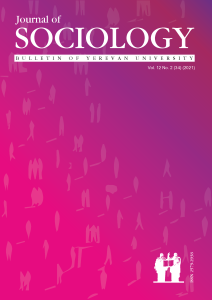Working in the Sphere of Food Trade and Service in Armenia: Patterns of Precariousness
DOI:
https://doi.org/10.46991/BYSU:F/2021.12.2.076Keywords:
precariousness, precarious patterns, food trade, food service sectorAbstract
The food trade and service sector is considered to be the most uncertain, with a strong expression of instability both worldwide and in Armenia. Currently, the term precariousness is widely used in the field to describe the uncertainty and risks in the field. Research on food trade and services in Armenia has been conducted recently, but there have been no sociological studies on patterns of precariousness in the field. The study of patterns of precariousness provides an in-depth look at sectoral uncertainty and risk in relation to broader social structures. The purpose of this article is to study the patterns of precariousness expressed in the field through secondary analysis, which will provide opportunities for deeper analysis in the future, emphasizing the expressions of social injustice and inequality.
References
Campbell I., Price R. (2016) "Precarious work and precarious workers: Towards an improved conceptualization", The Economic and Labour Relations Review. DOI: 10.1177/1035304616652074
Gardawski J., Mrozowicki A., Trappmann V., Andrejczuk M., Burski J., Czarzasty J., Drabina-Różewicz A., Lorenzen J., Karolak M., Krasowska A., Neumann D., Seehaus A. (2020) "Young Precarious Workers in Poland and Germany. Insights into life strategies, political consciousness and activism"// Source: https://repozytorium.uni.wroc.pl/dlibra/publication/115847/edition/107171?language=en
Haydon D., Kumar N. (2020) "Industries Most and Least Impacted by COVID-19 from a Probability of Default Perspective - September Update". Source: https://www.spglobal.com/marketintelligence/en/news-insights/blog/industries-most-and-least-impacted-by-covid19-from-a-probability-of-default-perspective-september-2020-update
Jonsson, I., Nyberg, A. (2010) "Sweden: precarious work and precarious unemployment" // in Gender and the contours of precarious employment. Vosko Working paper.
Labor Code of the Republic of Armenia, date of adoption: 09․11․2004, (in Armenian)․ Source: https://www.arlis.am/documentview.aspx?docid=66489
McGovern, P., Hill, S. and Mills, C. (2008) "Market, Class, and Employment", Oxford: Oxford University Press, ch. 3. DOI: 10.1093/acprof:oso/9780199213375.001.0001
McKay S., Jefferys S., Paraksevopoulou A., Kelesp J. (2012) "Study on Precarious work and social rights: Carried out for the European Commission", Working Lives Research Institute; Faculty of Social Sciences and Humanities; London Metropolitan University
Mikaelian, H. (2016) "Shadow economy in Armenia". Yerevan, Caucasus Institute
Mkrtchyan A., Osipyan A., Sahakyan S. (2020) "Social, economic and legal manifestations of Covid-19 pidemic in the Republic of Armenia", Konrad Adenauer Stiftung, Yerevan State University; Yerevan (in Armenian)
Rodgers J. Rodgers G. (1989) "Precarious Jobs in Labour Market Regulation: The Growth of Atypical Employment in Western Europe", International Institute for Labour Studies, Free University of Brussels
Standing G. (2011) "The Precariat: The New Dangerous Class", Bloomsbury Academic, New York. DOI: 10.5040/9781849664554
Vermishyan H., Michikyan S., Ghalamdaryan A., (2021) "Working conditions of employees in the field of food service and trade in Armenia", Armenian branch of the Friedrich Ebert Foundation (in Armenian)
Vosko L, MacDonald M., Campbell I․ (eds) (2009) "Gender and the Contours of Precarious Employment". London: Routledge. DOI: 10.4324/9780203874424
Vosko L․ (2010) "Managing the Margins: Gender, Citizenship, and the International Regulation of Precarious Employment". Oxford: Oxford University Press
Downloads
Published
How to Cite
Issue
Section
License
Copyright (c) 2021 Srbuhi Michikyan

This work is licensed under a Creative Commons Attribution-NonCommercial 4.0 International License.








